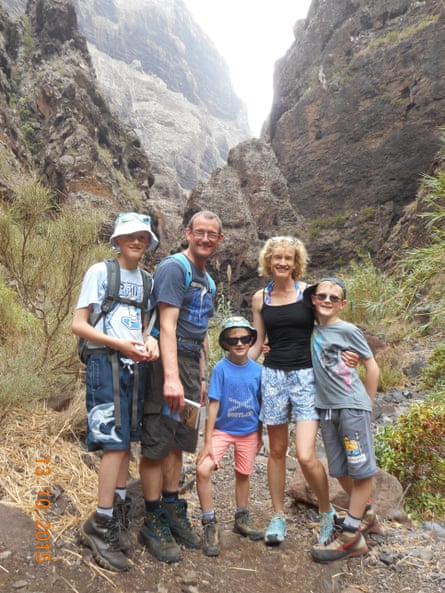From his earliest years, Corey Liversedge came alive on the mountains. He bagged his first Munro, Ben Chonzie, with assistance from mum and dad, at the age of five, graduating to harder climbs like the South Glen Shiel Ridge as he entered his teens. His mother Kerry helped him to record his summits in a scrapbook: by the age of 16 he had a grand total of 40.
Then came lockdown, and this active boy who swam in national competitions, found himself indoors and at bay, isolated from school friends, battling through exam coursework on a wonky internet connection at the home in rural Aberdeenshire he shared with Kerry, his father Adam, and younger brothers Torin, 13, and Glenn, 11.
Over the summer and into the autumn, as Scottish restrictions eased then tightened again, Corey got out on his mountain bike with friends, swam in a few quarries, but something had changed. And a little more than two weeks ago, as his parents put it with a tone of untranslatable loss, “he slipped through our fingers”. The family returned from a brief afternoon outing to find that their eldest son had taken his own life.
When Corey was cremated last Friday in Banchory, the streets were lined with mourners, many of them fellow pupils at the nearby academy. His death has convulsed the local community where, as Adam explains, “everybody knows”.
The family have been embraced by friends and strangers alike: the swimming club is organising a meal rota, and a crowdfunding appeal set up by Kerry has amassed £26,000, much of this from anonymous donations, which they hope to split between the mental health charity Men Matters Scotland and an organisation working on the climate crisis, a cause Corey had become passionate about after watching Blue Planet.
But alongside this comfort is the inevitable exposure of such a raw wound. A trip to the supermarket after the school run on the day has left Adam tearful: “You can just see people not knowing what to say and you just want to crawl into your shell.”
This is how Torin describes it to Kerry when he explains why he can’t face going back to the school he attended with his older brother: “Too many people looking at me, too many asking me, just too much.”

Adam and Kerry, both teachers, are aware that speaking to the media results in further exposure. But Adam has chosen to speak to the Guardian at length because it is the newspaper he reads and “I wanted to reach other parents who share our values”.
His message is simple enough: “Don’t put it down as just a teenage thing. Go for advice and help early. I’ll regret that ‘til the day I die.”
He emphasises that Corey did not have a diagnosed mental illness. “It could be any child.”
Adam describes in a jagged voice his visit to the police morgue, and looking through a pane of glass to identify his son. “The sympathetic police officer who stood close to us said ‘There’s been an increase this year’. If we can stop that happening to one other child then this will be worthwhile.”
As a secondary school teacher, Kerry also wants to see more training in mental health first aid: “I know how to perform CPR but I need to know how to unlock what’s going on in those heads,” she says.
Sometimes speaking across one another, shell-shocked witnesses to an indescribable catastrophe, they prompt one another’s memories as they attempt to patchwork some sense out of a shattering few weeks. “They all encouraged him to put Snapchat on to his phone but he didn’t want to.”
“There were times when he’d stay in his room and not want to get up. There were times when he would skip a meal. Part of me thought it was teenage angst and part of me thought ‘it’s not right’. I did ask him: ‘Have you had dark thoughts?’, is how I put it, and he said: ‘No Mum I haven’t’.”
“He opened up to you when I was off with the others,” Adam interjects. “He loved one-on-one time with mum,” Kerry agrees. She would make his favourite tea, spaghetti bolognese, and they would eat in on a tray while they watched a movie together.
After the uncertainty about his National 5 exams – he was awarded 5As and 2Bs on his prelim results – Corey was finding the additional homework and testing for his higher courses stressful, but Kerry was always clear to him that there were alternatives if he didn’t want to continue at school.
“I look at some of my students and I can see they are in a dark place and I try to say to them: who you are now isn’t who you will always be. Your potential is amazing and where you’re stuck now, you can move one step away from it and it will be different.”
Kerry says: “I wish I’d said it more fervently to Corey. You feel like you’re a bad parent and you’ve done something, not maybe wrong but not right. That there’s something else we should have done. He knew we loved him, we told him often.”
Both accept that they may never know exactly what happened to their son that Saturday. “I think that a dark place caught him and it overwhelmed him. Something overtook him and he slipped through our fingers. And like Adam, I will not forgive myself that we weren’t here.”
In the UK and Ireland, Samaritans can be contacted on 116 123 or email jo@samaritans.org or jo@samaritans.ie. In the US, the National Suicide Prevention Lifeline is 1-800-273-8255. In Australia, the crisis support service Lifeline is 13 11 14. Other international helplines can be found at www.befrienders.org.
